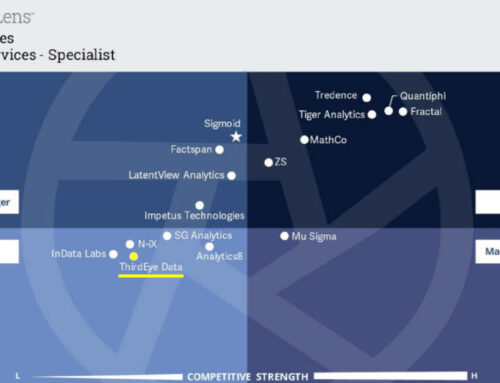Building out your data infrastructure? Why a data culture must come first
At a time when pandemic-stressed B2B companies need to develop better customer experience, marketing and service, artificial intelligence technology can play a crucial role, Aparajeeta Das of ClouDhiti writes.
COVID-19 has thrown business as usual out of the window for B2B companies across industries. Given the transition to online-only commerce for millions of organizations, it’s more important than ever for your digital presence and customer experience to be seamless. This is where artificial intelligence (AI) comes in. Implementing AI-powered tools into your online operations and customer service strategy can be the difference between inefficient processes and unsatisfied clients, and a thriving business in the face of the crisis.
The value of AI is already being realized across industry sectors; in fact, global management consulting firm PricewaterhouseCoopers predicts that the technology will generate $15.7 trillion globally by 2030. Here’s how B2B businesses can leverage AI to drive online customer experience, fine-tune operations management, and ultimately enhance their digital commerce presence.
AI empowers your customers with information
AI-powered chatbots allow online B2B companies to serve their customers with accurate and relevant information, 24/7. For example, you might be experiencing a surge in requests for information from customers or site visitors on such aspects as product availability, features, or other services that you offer. An AI-powered chatbot that’s enhanced with natural language processing and understands conversationally-worded requests can instantaneously provide this information without the need for a human representative. This is vital in times such as now, as the added uncertainty around the pandemic means business customers are seeking reliable answers and ways to adapt— and fast.
Semantic search offers another powerful way to ensure online companies meet customer needs with accurate and relevant information. Semantic search technology is able to comprehend a query based on its context, rather than simply the keywords it contains, and searches various types of data to provide the most relevant answer. Empowering your website search engine with semantic search capabilities ensures that site visitors receive the exact answer to their query, even when using conversational language.
By being able to answer queries such as “What are the product specifications?” “What are the tax regulations for selling this product?” or “Can you recommend compatible products?” you can increase customer satisfaction by providing them with access to the information you need, and add in an upsell opportunity according to their requests. Semantic search technologies are being increasingly adopted by organizations that prioritize customer access to accurate and pertinent information.
AI lets you better understand and target your customers
Leveraging AI can allow you to segment your customer base using data on their psychographic profile and behavior, and define patterns so as to provide personalized suggestions and offers for relevant products. This customer segmentation also allows you to streamline lead scoring and identify the most likely customers to make certain purchases, as well as making sure you only target them with relevant content. And adoption is growing: The August 2019 CMO Survey reported a 27% increase in the implementation of AI and machine learning in marketing toolkits compared to just six months prior.
For example, sellers on Amazon’s B2B marketplace are able to leverage the platform’s segmentation technology to target customers based on demographics, psychographics, situational, and geographical data. This allows them to personalize customer experience and product recommendations both on-site and via such channels as email marketing to maximize the chance of sales.
Especially amid the current crisis, business customers are conservative with their expenditure and will only make purchases that are truly necessary. The crisis has altered spending habits of the majority of companies, so it’s important to use data on this behavior to accurately target products that they are likely to need to help them maintain business continuity.
AI allows you to fine-tune operations management
When it comes to operations management AI-powered predictive analytics dashboards can give you vital insights into important aspects of your digital commerce strategy such as inventory management, demand forecasting, and supply chain efficiency.
By embedding your operations management with AI, you can better understand the likelihood of future events and plan accordingly—something that’s essential in today’s climate. For example, AI will take into account external factors such as weather and the data gathered from the Internet of Things (IoT) devices present along the supply chain. This could allow you to avoid manufacturing from scratch, ordering too much or too little inventory, or directing your stock in the wrong area, thus driving cost efficiencies.
For example, telecom manufacturer Infinera built AI and ML into its supply chain management to analyze production times and logistics routes to accurately predict delivery dates. This allows sales associates and customers to understand what products are available and when they can expect to receive them. AI combines historical data, customer survey feedback and weather reports to provide precise information about when customers will receive goods, enabling them to make better decisions and boosting satisfaction.
Tracking IoT devices for supply chain insights
When combined with AI, the analytics gathered from the real-time tracking of IoT devices can provide actionable insights that allow you to respond proactively to prevent issues along the supply chain, such as delays or damage. AI is proving to become a vital tool for digital commerce businesses seeking to keep their operations running smoothly—and reduce costs in the process. In fact, research from McKinsey found that 61% of executives reported decreased costs and 53% said revenue increased after introducing AI into their supply chains.
When combined with IoT, AI can also help manufacturers keep track of how machines are performing and any upcoming maintenance that may need to take place, allowing companies to plan accordingly and not lose out due to unplanned downtime. Manufacturers are also using IoT devices to automatically send alerts to customers when a new part is needed, and in some instances, even automatically re-ordering the part through the ecommerce platform. Manufacturers can also use AI to implement predictive maintenance so their customers receive the part ahead of time, limiting the downtime theywould otherwise experience while waiting for repair.
AI is here and it’s here to stay. Given its numerous benefits for B2B companies to drive customer experience, streamline operations, and boost efficiency, the return on investment of implementing AI is especially evident during crisis times. B2B companies that want to remain competitive in today’s hostile market must explore the possibilities of AI to enhance their digital commerce strategy.









